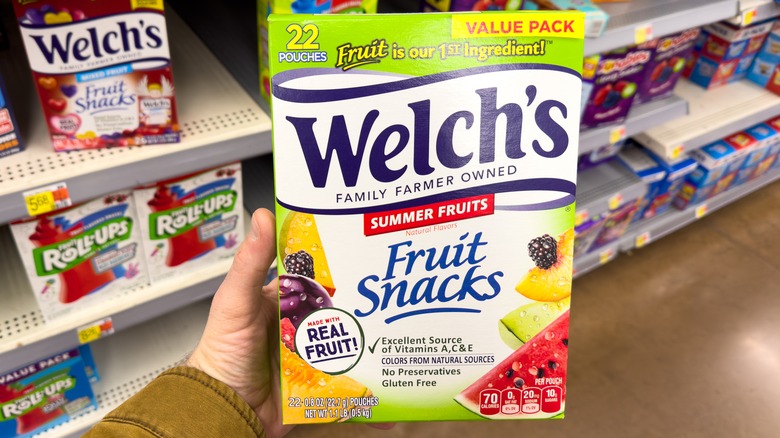Fruit Snacks Have An Unexpected Effect On Your Heart Health
Nestled next to a PB&J sandwich and a bag of carrot sticks, a pack of gummy fruit snacks is a welcome surprise in any child's lunchbox. Although you might see the words "real fruit" plastered across their packaging, research shows that not only are there healthier fruit options out there, but that some of the ingredients in gummy fruit snacks may increase our risk of heart issues.
While fruit snacks may not be directly tied to cardiovascular events, sugar is. Award-winning registered dietitian Toby Amidor shared via Food Network that these gummy snack pouches harbor approximately 5 teaspoons of added sugar. In a 2020 animal study published in the American Journal of Physiology Endocrinology and Metabolism, researchers found a connection between sugar intake and the development of metabolic syndrome in rats, regardless of whether the sugar tasted deliciously sweet or not. The researchers pointed out that metabolic syndrome can make a person more vulnerable to cardiovascular disease.
What is metabolic syndrome?
Affecting approximately 1 in every 3 people in the U.S., metabolic syndrome is also known as insulin resistance syndrome, according to the National Heart, Lung, and Blood Institute. Those diagnosed with metabolic syndrome have at least three out of five specified health conditions associated with increased cardiovascular disease risk. These conditions include hypertension, high blood sugar, high triglyceride levels, low levels of "good" cholesterol, and abdominal obesity.
While the findings of the rodent study relate to general sugar intake, researchers from the University of Massachusetts Amherst took a closer look at the nutritional value of various fruit snacks in a 2024 study published in the scientific journal Nutrients. The study team examined the nutrient profile of nearly 1,500 fruit snacks and categorized them as either dried fruit, dried flavored fruit, fruit puree, canned fruit, canned fruit with juice, fruit chips, fruit-based bars, formed fruit, or fruit-flavored snacks. Here's what they found.
Gummy fruit snacks have a low nutritional profile
The findings of the 2024 study revealed that dried fruit has the greatest amounts of fiber, lowest amounts of added sugar, and overall highest nutritional value. The opposite was true when it came to fruit-flavored gummy snacks, which were found to have the lowest fiber content, greatest amounts of added sugar, and lowest nutritional value. As stated in the research, the study team emphasized the need for reworking fruit snacks' food composition to help support healthier snack choices among consumers.
Registered dietitian Toby Amidor wrote that these fruity snacks aren't all bad, however. Containing between 80 and 90 calories in a single pouch, you won't find any fat or cholesterol in gummy fruit snacks. Many of these snacks also contain vitamins A and C as well as minimal amounts of sodium. All things considered, however, Amidor says we're better off with real fruit over gummy fruit snacks, which don't come with high amounts of sugar and artificial dyes. In fact, a 2017 study published in the International Journal of Epidemiology found that a diet rich in fruit (as well as vegetables) may help protect against cardiovascular disease and all-cause mortality — specifically apples, pears, and citrus fruit. Here are some other popular kids' snacks that may not be so healthy.



